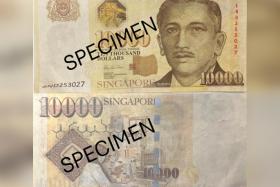Dickson Yeo case has no direct threat to Singapore’s security: MHA
LKY School of Public Policy terminates Yeo's PhD candidature as S'pore extends consular assistance to him
Investigations into the case of Dickson Yeo, a Singaporean who pleaded guilty last Friday to acting under the direction of Chinese intelligence officials to obtain sensitive information from Americans, have not revealed any direct threat to Singapore's security, the Ministry of Home Affairs (MHA) said yesterday.
In response to media queries, an MHA spokesman said the ministry was informed by the US authorities of the arrest of Yeo, 39, in November last year.
"Singaporeans are expected to abide by the laws of the country which they visit or reside in," added MHA.
Yeo's school, the Lee Kuan Yew School of Public Policy (LKYSPP), has terminated his PhD candidature "with immediate effect" in the light of information about him released by the US Department of Justice, a spokesman said yesterday.
Yeo enrolled as a PhD student in its public policy programme in 2015, the school confirmed. Last year, he applied for, and was granted, leave of absence.
Foreign Minister Vivian Balakrishnan yesterday said Singapore is extending consular assistance to Yeo.
"He's a Singapore citizen. Our duty is to provide consular assistance to him, according to his needs," said Dr Balakrishnan, who was speaking to reporters at the Immigration and Checkpoints Authority building in Woodlands, after a meeting with his Malaysian counterpart Hishammuddin Hussein.
He added that he has no further information to share on Yeo's case beyond what has been published.
He did not comment when asked about actions Singapore is taking to detect and prevent such espionage agents from operating locally and abroad.
Yeo, whose birth name is Yeo Jun Wei, pleaded guilty in federal court in Washington to one count of acting within the US as an illegal foreign agent.
At LKYSPP, he researched China's framework of treatment for small states along its Belt and Road Initiative trajectory, according to its website.
RECRUITED IN BEIJING
He was recruited in 2015 by China intelligence operatives during a visit to Beijing, where he gave a presentation on the political situation in South-east Asia, court documents showed.
In a statement of facts submitted to the court and signed by Yeo, he admitted to being fully aware that he was working for Chinese intelligence, meeting agents dozens of times and being given special treatment when he travelled to China.
He used his political consultancy in the US, which was set up in 2018, as a front to collect information for Chinese intelligence, said court documents.
He was tasked to spot and assess Americans with access to valuable non-public information, including American military and government employees with security clearance.
He used various social media sites to carry out his work.
Yeo would pay them to write reports that he said were meant for clients in Asia, but which were in reality sent to the Chinese government without the writers' knowledge.
The Straits Times spoke to a few people in Singapore who knew Yeo.
They described him as an easy-going person who was interested in current and global affairs, and who frequently spoke of his contacts and connections in China.
An LKYSPP graduate who was enrolled at the same time as Yeo said that Yeo, like most PhD students, had received a monthly stipend of about $2,000 from the school while doing his PhD. Yeo told him he started the consultancy as a way of supplementing his income, he recalled.
He added that Yeo had asked if he was keen to contribute to Yeo's consultancy work, and offered to link him up with research institutes under the People's Liberation Army if he needed to be hosted by an organisation to conduct fieldwork in China. He did not take Yeo up on both offers.
Mr William Nguyen, 34, who was enrolled in a master's in public policy course at LKYSPP from 2016 to 2018, said Yeo had tried to contact him several times via Facebook after June 2018, when Mr Nguyen made headlines after being detained in Ho Chi Minh City.
The writer and democracy activist had joined protests against proposed special economic zones, which protesters feared would result in Chinese control of Vietnamese territory, while he was on a visit to Vietnam.
Mr Nguyen did not respond to Yeo's messages, he said, as he had never met or spoken to him before.
NOT SHY, APPEARS HUMBLE
Dr Huang Jing, a former LKYSPP professor who was expelled from the school after the Government identified him as "an agent of influence of a foreign country" in 2017, said Yeo was one of his PhD students.
He added that he had not seen Yeo since around late 2016.
"He is not shy and appears humble, that's why people can feel relaxed with him around," he said of Yeo.
"I was shocked when another former student brought this news to me on Saturday, and I am glad that he was caught."
Get The New Paper on your phone with the free TNP app. Download from the Apple App Store or Google Play Store now


